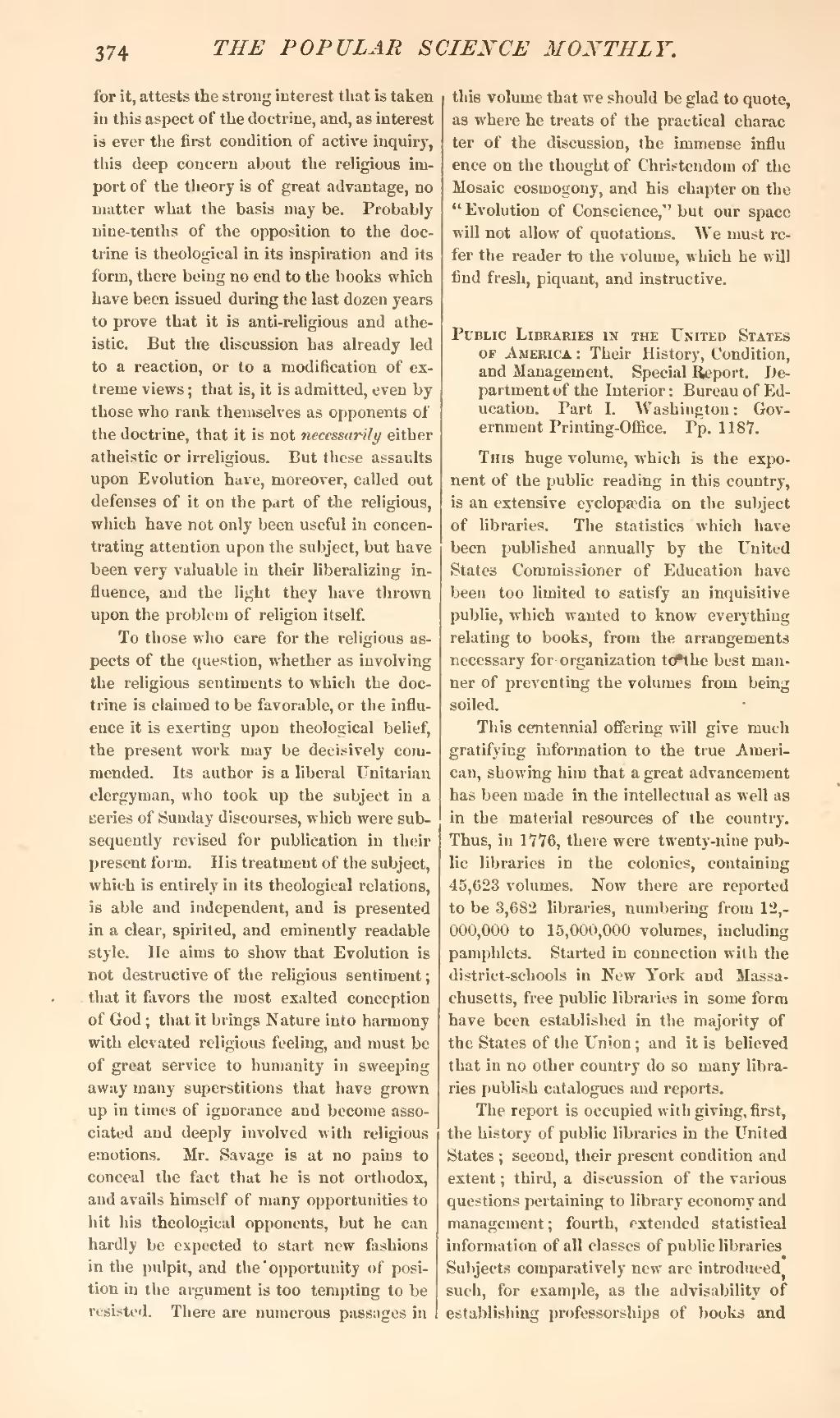for it, attests the strong interest that is taken in this aspect of the doctrine, and, as interest is ever the first condition of active inquiry, this deep concern about the religious import of the theory is of great advantage, no matter what the basis may be. Probably nine-tenths of the opposition to the doctrine is theological in its inspiration and its form, there being no end to the books which have been issued during the last dozen years to prove that it is anti-religious and atheistic. But the discussion has already led to a reaction, or to a modification of extreme views; that is, it is admitted, even by those who rank themselves as opponents of the doctrine, that it is not necessarily either atheistic or irreligious. But these assaults upon Evolution have, moreover, called out defenses of it on the part of the religious, which have not only been useful in concentrating attention upon the subject, but have been very valuable in their liberalizing influence, and the light they have thrown upon the problem of religion itself.
To those who care for the religious aspects of the question, whether as involving the religious sentiments to which the doctrine is claimed to be favorable, or the influence it is exerting upon theological belief, the present work may be decisively commended. Its author is a liberal Unitarian clergyman, who took up the subject in a aeries of Sunday discourses, which were subsequently revised for publication in their present form. His treatment of the subject, which is entirely in its theological relations, is able and independent, and is presented in a clear, spirited, and eminently readable style. He aims to show that Evolution is not destructive of the religious sentiment; that it favors the most exalted conception of God; that it brings Nature into harmony with elevated religious feeling, and must be of great service to humanity in sweeping away many superstitions that have grown up in times of ignorance and become associated and deeply involved with religious emotions. Mr. Savage is at no pains to conceal the fact that he is not orthodox, and avails himself of many opportunities to hit his theological opponents, but he can hardly be expected to start new fashions in the pulpit, and the opportunity of position in the argument is too tempting to be resisted. There are numerous passages in this volume that we should be glad to quote, as where he treats of the practical character of the discussion, the immense influence on the thought of Christendom of the Mosaic cosmogony, and his chapter on the "Evolution of Conscience," but our space will not allow of quotations. We must refer the reader to the volume, which he will find fresh, piquant, and instructive.
Public Libraries in the United States of America: Their History, Condition, and Management. Special Export. Department of the Interior: Bureau of Education. Part I. Washington: Government Printing-Office. Pp. 1187.
This huge volume, which is the exponent of the public reading in this country, is an extensive cyclopædia on the subject of libraries. The statistics which have been published annually by the United States Commissioner of Education have been too limited to satisfy an inquisitive public, which wanted to know everything relating to books, from the arrangements necessary for organization to the best manner of preventing the volumes from being soiled.
This centennial offering will give much gratifying information to the true American, showing him that a great advancement has been made in the intellectual as well as in the material resources of the country. Thus, in 1776, there were twenty-nine public libraries in the colonies, containing 45,623 volumes. Now there are reported to be 3,682 libraries, numbering from 12,000,000 to 15,000,000 volumes, including pamphlets. Started in connection with the district-schools in New York and Massachusetts, free public libraries in some form have been established in the majority of the States of the Union; and it is believed that in no other country do so many libraries publish catalogues and reports.
The report is occupied with giving, first, the history of public libraries in the United States; second, their present condition and extent; third, a discussion of the various questions pertaining to library economy and management; fourth, extended statistical information of all classes of public libraries Subjects comparatively new are introduced such, for example, as the advisability of establishing professorships of books and

